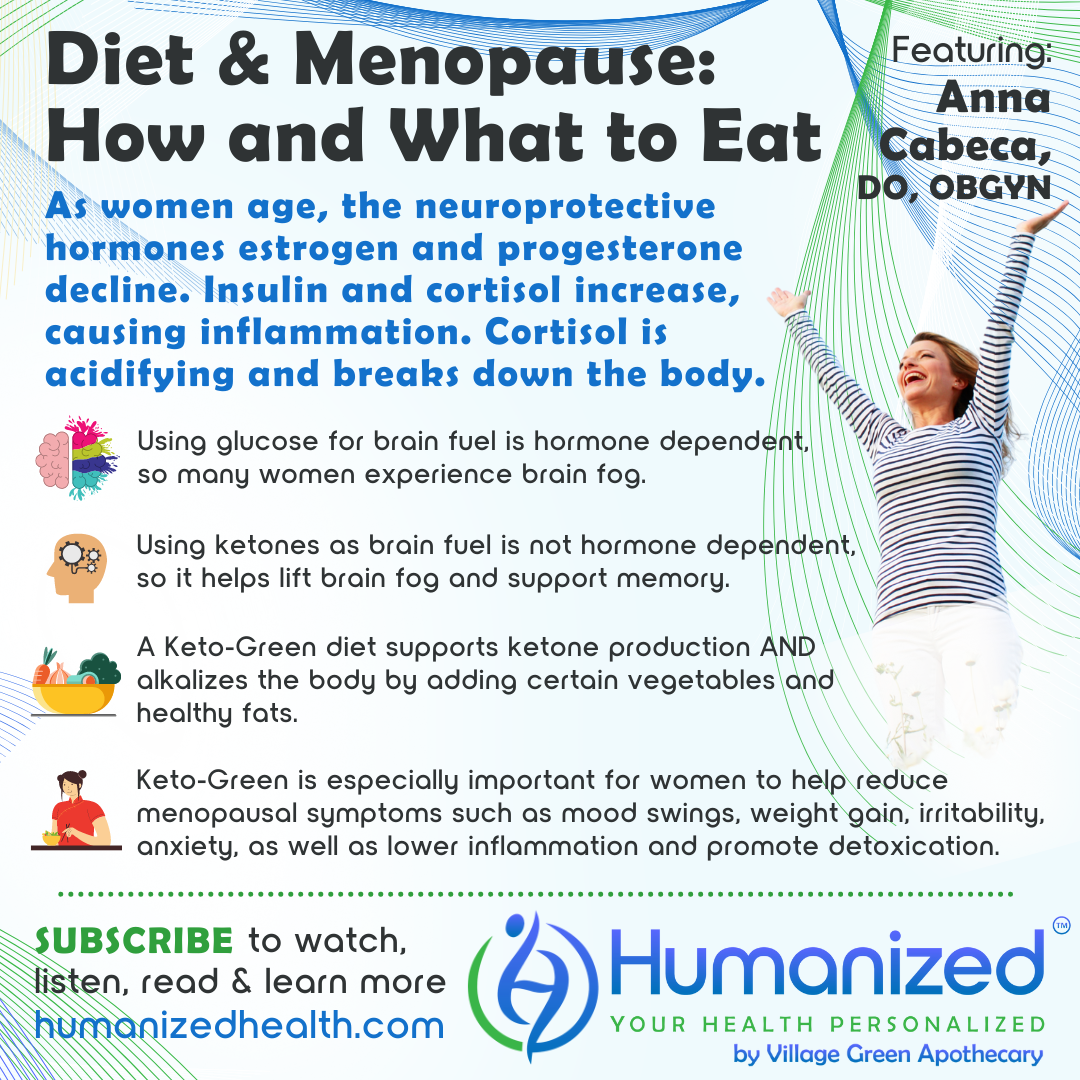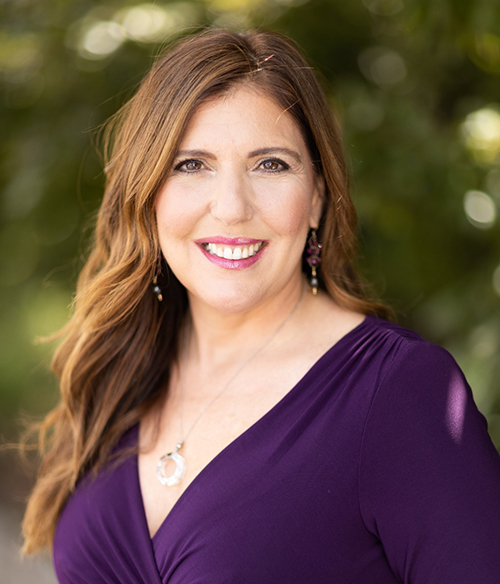Diet and Menopause: How and What to Eat
Featuring
Anna Cabeca, DO, OBGYN, FACOG
WATCH
LISTEN
READ
Rebekah Kelley: Welcome to the Humanized podcast, all about personalizing your health. I am your host, Rebekah Kelley, and today we’ll be discussing Diet and Menopause: How and What to Eat, with Dr. Anna Cabeca. Before I introduce Dr. Cabeca, I want to remind everyone to subscribe and get all of our variety of casts in audio, video and transcription at HumanizedHealth.com. I’d also like to thank our lead sponsor, Village Green Apothecary, at MyVillageGreen.com.
A little bit about Dr. Anna. She is a board certified, a triple board certified and fellow of gynecology and obstetrics, integrative medicine, and anti-aging and regenerative medicine. Nationally known as “the girlfriend’s doctor,” Dr. Anna is a passionate health advocate for women, helping them to truly thrive in body, mind and spirit. She is the author of two highly acclaimed books, created several popular virtual transformation programs, created several top-selling health products, and a sought-after lecturer throughout the world.
Thank you so much for being with us, Dr. Anna, we’re so thrilled. I’m thrilled.
Anna Cabeca: Well, I am thrilled too, it’s a privilege. Thanks for having me.
Rebekah Kelley: So, I just want to jump right in. Our hormones, what are they, how do they influence our health and how do they change as we age, especially as it relates to menopause?
Anna Cabeca: You know, it’s really important to understand. Hormones, we’ve known them to be chemical messengers and they interact with all different parts of our body. I mean, like a ping pong effect, if you will. Or pin ball, sometimes it may feel like. But hormones are really these energetic messengers. And that’s why it’s so frustrating for women, for us, when we go to our doctor and they said, we really can’t test them. And that’s the truth, because even if we’re looking at saliva, urine, blood, and when we look at all three ways in the functional approach, and until we really understand the energetic component and the energetic way to test them – and I look forward to that day where… we kind of missed the boat on really getting a clear picture of how our hormones are interacting with each other. But the mystery is unfolding. And for women, we focus a lot on our reproductive hormones, you know, estrogen, progesterone, testosterone, and even DHEA. And when it comes down to the master hormones in our body, our cortisol, insulin, and my absolute favorite hormone that I’m absolutely in love love love with, the hormone of love, bonding and connection, and that’s oxytocin. Not to be confused with oxycodone.
Rebekah Kelley: [Laughs] Very different. So the process of our brain using glucose for fuel is a very estrogen dominant process. And as estrogen decreases as we age, obviously this is not ideal. I know you talk in your book about how ketones are better served as fuel here. Could you talk about that?
Anna Cabeca: Yes, it’s so important to understand this. Because when I was 48, turning 48, going through my second menopause, I had the weight gain without doing anything different. That’s so frustrating. And until I went through it myself, I didn’t really one hundred percent believe my patients when they would tell me that. A very humbling experience. But the brain fog, the memory loss, the irritability, the monster within, as some patients described it, I experienced that too, that kind of erupts her ugly head – that was not me. And the weight gain was most troublesome. This is what took me on this journey and what I’ve written about now for years. But what was really important to understand, what I learned through this process and developing the plan I call Keto-Green, was that for our brain to use glucose for fuel, it’s hormone dependent. And for now, we know that it’s estrogen, but I really believe, Rebekah, that progesterone is a game changer and this is the key master hormone in this. But for now we say, gluconeogenesis in the brain we know is estrogen dependent. And as we lose estrogen, as we age, the brain may be suffocating a little bit and is struggling and is challenged, because that process is estrogen dependent. But ketone use in the brain is not. We completely bypass that hormone component and that’s when our brain lights up, our brain fog lifts, our memory gets better, and if we add the key part that I call the green or the alkalinizing part, add that and we’re back at home in our body. And our hormones, you are going through this hormone fluctuation, it’s not just a “good idea” to go Keto-Green, it’s in my opinion, mandatory. So I’ll never say direct keto, there’s dirty keto out there, and we don’t want dirty keto.
Rebekah Kelley: So then could the lack of estrogen as we age be the reason women are two times as likely to get Alzheimer’s? Is that kind of hand-in-hand?
Anna Cabeca: I think it’s a big process. Cause there’s a few things that are happening with this perimenopause. You lose that progesterone, which is neuroprotective, and it’s not getting replaced most of the time, for the long haul. And I really believe progesterone is one of those key hormones. Supporting our natural body’s production of progesterone.
But also, bioidentical progesterone replacement, especially as we’re older, transdermally, safely – we don’t have to take a pill – safely, to be protective. And I think that we’re going to see some more research on that. We know progesterone has effects on the brain. So this loss of estrogen, the increase in insulin and increase in cortisol as we age are two other really key factors, as well.
So I think between those four top [things]… we have some disadvantages and that’s why becoming more insulin sensitive, managing cortisol, increasing oxytocin – that cortisol’s an acidifying hormone, it’s a caustic hormone, it breaks us down – and becoming more on the alkaline side, hence the greens and the alkalinizers. I know from our community that have been doing Keto-Green for a few years now, tens of thousands of them, their memory is better than ever, and they feel at home in their body. And that’s what we’re going for here.
Rebekah Kelley: So you put a twist on your approach of creating the Keto-Green way and bringing alkalinity into the picture. I don’t know whether one would say controversy, but you know, with the blood pH not changing, right? There’s some question around that. So can you just kind of explain a little bit?
Anna Cabeca: Yeah. And I love this because you’ve heard really big out there, oh, that’s an alkaline myth. Well, that right there is a myth. Because we know, I know as a surgeon and a physician, that if a patient comes into my emergency room or comes into my clinic crashing, I’m going to draw an arterial blood gas. That’s the first thing we do in the ER, we draw an arterial blood gas, and we want to assess the pH of the blood. How acidic is this person? What’s going on with this person? The pH we’re going to manage… and that’s your arterial blood gas, right? Not venous, not drawn blood out, but that’s the arterial blood gas. And that is, oxygenation is key for alkalinization of the blood. Maintaining a slightly alkaline pH, 7.4 approximately.
So we maintain this a little bit higher, a little bit lower, and we are really, really sick. And that’s why we draw this pH. And often when we give bicarb to that crashing person, who’s in an acidotic state, for whatever reason it could be. It could be from cancer, could be from malnutrition, it could be from alcoholism, it could be, whatever it may be. So that’s critical, that pH. Our body will rob Peter to pay Paul, to maintain that blood pH.
But what are the stages until we get there? Our cells have different pH. Skin, slightly acidic. Why? Because we need to defend, it’s our first layer of defense. The vagina, acidic. I mean, it takes millions of sperm to get past that acidic environment. Right? Millions over the centuries have been evolved because, it’s like, got survival of the fittest. Why? Cause they’ve got to first go through an acidic vagina. It’s protective, meant to protect us against bacteria. And man, I may get into this because, all these vaginal, like different vaginal washes and soaps and things that are destroying our vaginal pH, you’re destroying your primary line of duty. And that is so key. Oral health is key. Vaginal health is key, but look, it knows what it’s doing. Mostly leave it alone. And so there’s that piece.
And then the bladder, the bladder is a barometer. Just like we take our temperature, I believe measuring your urinary pH is like that, is a barometer for your overall health. When we are stressed, unhealthy, our urine pH is acidic. When we are grounded, when we go for a hike with friends in the woods, and are hydrated well, we are alkaline. When we are eating well, we’re more alkaline. And research, scientific studies, many scientific studies have shown that a more alkaline urine, pH greater than seven, everyone can test it, it costs pennies to go to any grocery store and get some pH paper, or I have pH and ketone paper, but you just test it for pennies and check and see what it is. And it will change throughout the day. If you’ve had stressful exercise, you’ll be more acidic. That’s okay. We want to tear down and build up tissue. But you’ve had a great night of lovemaking, you should be more alkaline in the morning. Right? And if you’re eating well, the ketogenic diet is acidic until you add that alkaline component, which is key for women. That just makes all the difference in the world. You balance both. And what we know and what many women in my communities will say, combine that alkalinity with the ketosis. And it is lights on, feel amazing, feel at home in your body, and you’re super charged. And I love hearing that.
Rebekah Kelley: Thanks Dr. Cabeca, those are really valuable insights. Dr. Anna Cabeca can be found at www.DrAnnaCabeca.com. I’m going to spell that. That’s D-R-A-N-N-A-C-A-B-E-C-A.com. Let me remind you to subscribe and get access to all Humanized videos, podcasts and transcriptions from all of our thought leaders on personalized health at HumanizedHealth.com.








